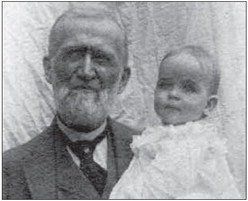'Perfect Christian gentleman' was ardent abolitionist

For over 25 years, William H. Gay was the Chicago, Burlington and Quincy Railroad’s ticket agent at the local depot.
A familiar figure about town, regularly seen pedaling his bicycle to and from work, the venerable Civil War veteran was one of the Gem City’s “best known and highest esteemed citizens.”
Captain Gay, as he was addressed, was “a quiet, sober, earnest man....” He was said to be “conscientious to a fault, absolutely honest, in truth a perfect Christian gentleman,” who “had always a kindly, cordial word” for all. He was a deacon and Sunday school teacher at the Congregational church. For a number of years he commanded Quincy’s Grand Army of the Republic post. And, these were not the least of his interests, “from early boyhood,” he “took an abiding interest in national affairs....”
Until his death on April 3, 1918, Capt. William H. Gay led a full and active life. Forty of those years were spent in Quincy, where he lived an unassuming existence. However, during an earlier
time, he found himself both as an observer of and as a participant in events whose outcome still affects our country.
Gay was born May 22, 1833, in Bridgeport, Vt. His father, Lusher, journeyed to Illinois and purchased land in Knox County, near what would become Galesburg and moved there in 1836.
William attended Knox College from 1848 through 1854. Knox’s president was the Rev. Jonathan Blanchard, an abolitionist preacher. On Oct. 13, 1854, in Knoxville, Sen.
Stephen A. Douglas agreed
to debate Blanchard. With Congress in recess, Douglas had returned to Illinois to mend fences and defend the Kansas-Nebraska Act.
This legislation repealed the Missouri Compromise and reopened the extension of the slavery issue.
Attending the debate, William recalled that Blanchard gave Douglas a “merciless lashing,” and “it was a castigation I never can forget.”
Douglas appealed to “ ‘the loyal, true, and faithful Democrats of Knox County,’ who for a quarter of a century had been his friends, never to desert
the standard of Democracy.” He set out to diminish the “Anti-Nebraska party, made up of Whigs, renegade Democrats, and Abolitionists,” and he said “that the new party ... was ready to go to any extreme in interfering with slavery in the States, as well as in the Territories, without regard to constitutional rights ... that the speaker (Blanchard) had, by what he said ... favored equality with the negro, social as well as political....”
An amalgamation of old-line Whigs, Free-Soil Democrats and Anti-Nebraska men came together to form the Republican Party, and in 1856, they put forth a candidate for president.
William cast his first vote for Republican John C. Fremont.
In 1858, Abraham Lincoln ran against Douglas for the Senate, challenging the incumbent to a series of debates. On Oct. 7, 1858, the candidates met in Galesburg. William was in the crowd and later said: “It was my great good fortune to see and hear Mr. Lincoln ... in debate with Douglas, and the impression made upon my mind will never be effaced.”
A year-and-a-half later,
Abraham Lincoln was a contender for the Republican presidential nomination. From the debates, William later wrote: “The country saw the powers and virtues of the man, and when the great and notable convention of 1860 met at Chicago, his name stood well in the eyes of the people.” It was William’s “great privilege to attend that convention, be present at all of its proceedings and see so many of the great Union leaders of the North, and hear them speak upon the vital questions of the hour.”
With the outbreak of hostilities, William volunteered on July 4, 1861, planning to join an infantry company. When that fell through, he went to Burlington, Iowa, and enlisted in a light artillery unit. He was mustered into service on Aug. 17 as the battery’s quartermaster sergeant. Three years later, Aug. 18, 1864, William received his captain’s commission
and command of the battery. He saw extensive action and was especially proud “that his battery fired the first shot that inaugurated the battle of Lookout Mountain.”
On April 2, 1918, Captain Gay attended the G.A.R. meeting, and on his way home “[he] was blown from the sidewalk by a strong gust of wind,” causing him to fall and “strike his head on the pavement. . . .” The Herald reported: “One of the best known men in Quincy, veteran of the civil war, public spirited citizen, [and] friend of hundreds . . . died early this morning of an accident.”
Phil Reyburn is a retired field representative for the Social Security Administration. He wrote “Clear the Track: A History of the Eighty-ninth Illinois Volunteer Infantry, The Railroad Regiment” and co-edited “ ‘Jottings from Dixie:’ The Civil War Dispatches of Sergeant Major Stephen F. Fleharty, U.S.A.”






